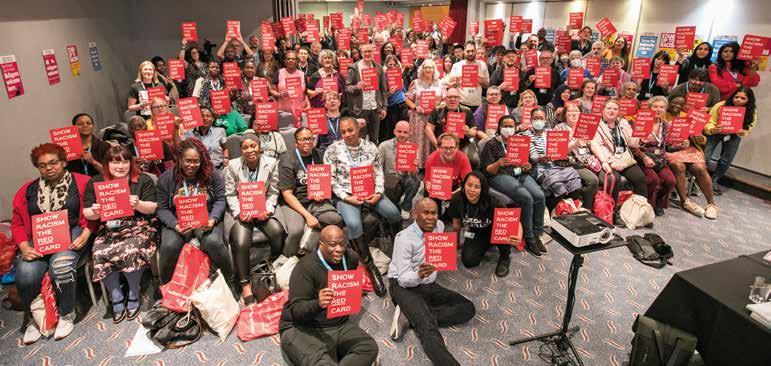
4 minute read
TPS battles commence
A hike in employer contributions means many independent schools are trying to leave the Teachers’ Pension Scheme (TPS). But they have a fight on their hands – members are striking to protect a key part of their remuneration.
A pension is not a perk
Protesting to save their teachers’ pension, NEU members on the picket line outside Putney High School on pancake day were among 1,200 teachers employed by the Girls’ Day School Trust (GDST) who took action.
Mostly women, the teachers joined pickets at the GDST’s 23 schools in England and Wales over six strike days in February and March. Together, they made the attack on their pension national news.
The strikes – the first in the trust’s 149-year history – took place alongside

high-profile action in central London.
Some 300 members gathered outside GDST’s head office in Victoria, and in neighbouring Westminster, 500 members, with representatives of all 23 schools, made Parliament Square their home. They were joined on the green by 30 MPs and a member of the House of Lords. Over 25,000 people viewed their live Twitter stream.
By mid-March, the GDST had backed down. Kester Brewin, an NEU rep and teacher at Sydenham High School in south London, said: “We are deeply saddened that the offer to honour our contractual entitlement to the TPS and rescind the threat to fire and rehire us was only made after six days of industrial action.
“All of this disruption, damage to reputation, and trust and confidence between teachers and GDST could have been avoided. There is a huge amount of active work that must now be done by GDST to rebuild staff trust and confidence.”
There is also the “fundamentally wrong” decision by the GDST to close the scheme to future teachers, he added.
“It will adversely affect the schools’ ability to recruit quality teachers in the future, who are likely to join competitor independent schools offering the TPS or state schools.”
The action by members at GDST grabbed headlines, partly because of its sheer scale, but the trust is just one of many independent sector employers trying to deny teachers what is a key part of their remuneration package.
The move has been prompted by the increase in the employer contribution to the scheme from 16 to 23 per cent in September, which schools say makes it unaffordable.
They also fear another increase when the Government re-evaluates the scheme, which was due to happen in 2023 but has been delayed until 2024 because of the pandemic.
Opt out of TPS – or it’s fire and rehire
At the 600-year-old Ipswich School, staff became the first ever to strike when they took three days of action in March after being threatened with fire and rehire if they did not agree to new contracts opting out of the TPS.
As with the GDST action, it took the intervention of Acas to settle the dispute.
NEU members on picket lines and marches around the country, fighting to save their pensions – from Nottingham to Notting Hill; from Wales to Westminster






Ipswich and South Suffolk district secretary Craig Tournay-Godfrey, who supported the union’s 54 members, says governors were taken aback by how many staff had been prepared to go on strike.
“It’s unbelievable that the employer should have just expected staff to accept losing their TPS,” he says.
Teachers will remain in the TPS, and those starting from September can also join. But it isn’t all good news. New starters will be required to sign a variation of contract letter that says if the employer contribution to TPS increases to 27 per cent or above they will sign a new contract agreeing to leave the scheme.
“That will put teachers off joining that school, if they want to stay in the TPS,” argues Craig. “I don’t think the school understood how important the TPS is to teachers.”
If the 27 per cent “trigger point” is reached, the school will enter negotiations with the union on whether the TPS is affordable.
“We are really pleased that the staff, who have taken a stand, have made the school change its plans,” he says. For now, at least, teachers will keep their pension.
TPS success at 60 independent schools
Members at more than 60 independent schools have successfully defeated their employer’s proposals to deprive them of the TPS. Usually, however, the employer only backs down when strike action is threatened.
Members have learned that success comes from a strong collective union response, acting early, and the leverage of the threat of industrial action.
Three strike days at Forest School, in east London (see page 19), saw off the threat to the TPS. Staff are “jubilant”, says NEU rep Pablo Phillips, who, along with his joint branch secretary Sandra Faria, supported staff.
“The TPS success at Forest School has triggered a strike wave,” he says. “Members at other schools in the area are looking at it and thinking if you can have success at an independent school, you can succeed anywhere.”










